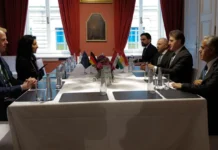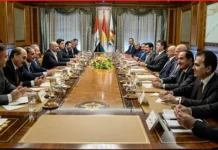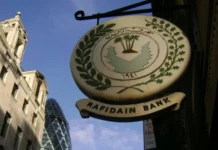The Central Bank Of Iraq Has Settled The Matter: No Floating Of The Dinar, And A Plan To Remove Zeros Soon.
October 14, 2025 Last updated: October 14, 2025 Al-Mustaqillah – In new statements revealing the contours of the upcoming monetary policy, the Deputy Governor of the Central Bank of Iraq, Ammar Khalaf, confirmed in an exclusive interview with CNBC Arabia, which Al-Mustaqillah followed, that there is no intention to float the Iraqi dinar exchange rate at the present time. He noted that the Central Bank is keen to maintain the stability of the national economy and prevent any instability in the local market.
Khalaf explained that the decision to stabilize the exchange rate falls within the bank’s vision to support price stability and protect citizens’ purchasing power, especially in light of the economic challenges facing the country and the global fluctuations affecting currencies and markets.
In another context, the Deputy Governor revealed an intention to remove zeros from the Iraqi currency, explaining that the goal of this step is to ease the burden on the financial sector and reduce the accumulation of banknotes in circulation.
He pointed out that this process requires careful study and prior planning to ensure its implementation without any negative impact on financial transactions or confidence in the currency.
Economists believe that the Central Bank‘s decision not to float the dinar reflects the financial institution’s desire to avoid economic shocks that could raise inflation rates and impact citizens’ purchasing power.
Meanwhile, the project to remove zeros could facilitate financial transactions and improve the efficiency of the monetary system in the long term.
These statements come at a time when Iraqi monetary policy is witnessing a sensitive phase of reform, with the Central Bank seeking to balance financial stability with meeting the requirements of economic growth.
https://mustaqila.com/البنك-المركزي-العراقي-يحسمها-لا-تعويم/
Central Bank: Gold Reserves Reach 170 Tons, With Intention To Remove Zeros From Dinar
Baghdad Today – Baghdad The Central Bank of Iraq announced, on Tuesday, October 14, 2025, its gold reserves and its intention to remove zeros from the Iraqi currency.
Deputy Governor of the Central Bank, Ammar Khalaf, said in a press statement, followed by Baghdad Today, that:
“The Central Bank of Iraq has increased its gold holdings from 90 tons to 170 tons at the present time.” Khalaf added, “This amount of gold now constitutes 20% of the Central Bank’s total assets, and Iraq currently ranks fourth in the Arab world in gold holdings and 29th globally.”
The Deputy Governor of the Central Bank confirmed that “there is no intention to float the Iraqi dinar exchange rate, so as not to affect the stability of the economy at the present time.” Khalaf revealed that “there is an intention to remove zeros from the Iraqi dinar to ease the burden of banknote hoarding on the financial sector.” Source: CNBC Arabia https://baghdadtoday.news/285214-170.htm
Mali cosmetics Removing Zeros: 170 Tons Of Gold And One Decision On The Table… Will The Iraqi Dinar Survive Erosion?
Economy / Special Files Yesterday, 4:00 PM | 5376 Baghdad Today – Baghdad Amid the complexities of the financial landscape and increasing pressures on the money supply, the Central Bank of Iraq is opening the door to one of the most sensitive decisions in its modern monetary history: the project to remove zeros from the local currency.
This step coincides with the bank’s announcement that it will increase its gold reserves from 90 tons to 170 tons, representing approximately 20% of its total assets and placing Iraq fourth in the Arab world and twenty-ninth globally in terms of gold reserves.
Meanwhile, Deputy Governor of the Central Bank, Ammar Khalaf, confirmed that there is no intention to float the Iraqi dinar exchange rate in order to preserve the stability of the financial market and the national economy.
He noted that “there is an intention to remove zeros from the currency to alleviate the burden resulting from the accumulation of banknotes within the financial sector.”
He explained that the goal of the measure is to reduce transportation and storage costs and improve the efficiency of cash circulation.
However, this step, which appears to be technical and reformist on the surface, has raised a wave of questions about its actual effectiveness, and whether it represents a radical solution to the monetary policy crises, or whether it is merely a cosmetic measure to relieve pressure without addressing the core structural imbalances in the Iraqi economy.
According to estimates by international monetary institutions, Iraq is currently experiencing moderate inflation of around 2.5%, a relatively stable environment compared to previous years.
However, the money supply (M0) reached historic levels at the end of 2023, making cash transactions a logistical burden for banks and institutions.
Comparative studies indicate that deleting zeros is a technical accounting step that does not change purchasing power, but rather simplifies calculations and reduces errors in financial systems. However, the success of this step depends on its integration with comprehensive economic reform, rather than a measure isolated from the overall financial reality.
Economic expert Ahmed Al-Tamimi told Baghdad Today that “the project to remove zeros from the Iraqi currency represents an important reform step that will facilitate monetary transactions and reduce administrative and logistical burdens on the country’s financial and banking system, provided it is implemented within a well-thought-out, comprehensive plan that takes into account economic and market stability.”
Al-Tamimi adds, “The accumulation of banknotes resulting from the current bulk of paper money is a significant burden on the financial sector, requiring additional costs in transportation, storage, and management, in addition to making daily transactions difficult for citizens and institutions.”
ccording to comparative economic approaches, countries such as Turkey in 2005 and Ghana in 2007 saw relative success in removing zeros after long periods of stability and strict financial discipline.
The move helped reduce the costs of cash transactions and boost confidence in the currency.
However, failed experiments, such as those in Zimbabwe and Venezuela, have shown that removing zeros without institutional reform opens the door to renewed inflation and undermines public confidence in the national currency.
Al-Tamimi continues, “Removing zeros will not change the dinar‘s purchasing power per se, but it will contribute to simplifying the accounting and financial system and reducing significant numerical discrepancies in financial statements, making money management more efficient and easier to use within government institutions and the private banking sector.”
He points out that the success of the experiment depends on “a stable economic environment, effective control of inflation rates, and close cooperation between the Central Bank and the Ministry of Finance to ensure a smooth transition without market disruptions or a loss of confidence in the national currency.”
According to accurate economic readings, Iraq today stands at a crossroads between comprehensive monetary reform and a symbolic measure with limited impact.
Removing zeros may be technically beneficial, but it becomes dangerous if perceived as an attempt to conceal structural crises under an administrative guise.
Analysts warn that poor timing or poor communication with public opinion could lead to pricing confusion and possibly “silent inflationary cycles” exploited by some commercial parties.
Al-Tamimi concluded his statement by saying, “The primary objective of this step is to enhance confidence in the Iraqi dinar, facilitate financial transactions, and reduce the burdens resulting from the accumulation of paper currency.
It is also a structural reform in monetary policy that should be included within a comprehensive economic reform program that serves the stability of the dinar and enhances its efficiency in domestic and international transactions.”
Modern economic analyses confirm that strengthening the gold reserve provides the central bank with moral cover for any future monetary reform.
However, it does not replace financial control, strict oversight of public spending, and rebuilding trust between monetary policy and the economic community. https://baghdadtoday.news/285251-170.html
For current and reliable Iraqi news please visit: https://www.bondladyscorner.com






